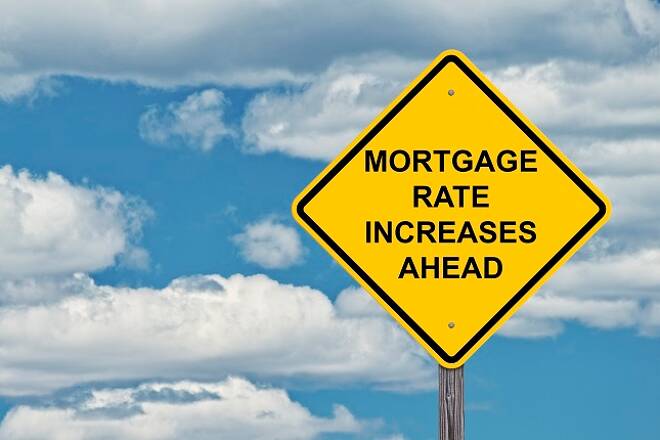Advertisement
Advertisement
U.S Mortgage Rates Take a Breather
By:
U.S mortgage rates pullback from 17-year highs, while upward trend will likely continue through the remainder of the year.
There was some respite for prospective home buyers last week, with mortgage rates easing back from May 2011 highs, 30-year fixed mortgage rates sliding by 10 basis points to 4.56% according to figures released by Freddie Mac.
Treasury yields continued to see volatility stemming from sentiment towards the U.S economy and FED monetary policy, coupled with trade war jitters and geo-political risk in Europe.
Economic data released last week included the FED’s referred Core PCE Price Index figures for April, which saw the annual rate of core inflation hold at 1.8%, easing concerns of a more aggressive rate path for the year, though the latest FOMC meeting minutes had talked of a willingness to allow inflation to overshoot the 2% target for a short period of time, adding further downward pressure on yields.
While inflation figures were steady, there was some good news on the labour market front at the end of the week, with wage growth rising at a quicker pace in May and labour market conditions tightening further, the U.S unemployment rate falling to 3.8%.
The uptick in wage growth was certainly timely considering the upward trend in mortgage rates and will offset some of the cost impact of rising mortgage rates on disposable incomes, though continued demand for homes will weigh on inventories to drive house prices further northwards.
Whilst the market panic over inflation and FED policy abated through the week, Italian and Spanish politics took centre stage, with the 5 Star- League coalition eventually forming government after a start of the week hiccup that roiled the global financial markets. The week ended with Spanish Prime Minister Rajoy being ousted in a vote of no confidence that takes two of the Eurozone’s larger economies into a period of uncertainty that will continue to drive volatility in the bond markets that ultimately impact mortgage rates.
Adding to the geo-political risk that has contributed to the direction of mortgage rates through the year, is U.S – China trade talks over the weekend and the U.S – North Korea Summit. The green light for the Summit on 12th June was the good news, while Trump’s apparent desire to wage a trade war with China and any other economy unwilling to cede to U.S demands was the negative. How talks progress through the weekend will influence yields and mortgage rates in the week ahead.
Freddie Mac weekly average rates for new mortgages as of 31st May were quoted to be:
- 30-year fixed rate loan slipped from 4.66% to 4.56% last week, while up from 3.94% a year ago.
- 15-year fixed rates fell from 4.15% to 4.06% last week, while up from 3.19% from a year ago.
- 5-year fixed rates fell from 3.87% to 3.80% over the week, while up from last year’s 3.11%.
Mortgage Bankers’ Association Rates for the week ending 30th May were quoted to be:
- Average interest rates for 30-year fixed, backed by the FHA fell from 4.90% to 4.85%, easing from the previous week’s May-11 high.
- Average interest rate for 30-year fixed with conforming loan balances rose slipped from 4.86% to $4.84%.
- Average 30-year rates for jumbo loan balances decreased from 4.81% to 4.73%.
Weekly figures released by the Mortgage bankers Association showed that the Market Composite Index, which is a measure of mortgage loan application volume, fell by 2.9%, following the previous week’s 2.6% fall week-on-week. The fall coming off the back of jump in mortgage rates in the week ending 24th May, while supply continues to be an issue.
The Refinance Index also fell, down 5% to its lowest level since Dec-2000, following the previous week’s 4% fall, with the refinance share of mortgage activity falling further to 35.3% of total applications, the lowest level since August 2008 and down from the previous week’s 35.7%, as the downward trend continues.
For the week ahead, economic data out of the U.S includes May’s service sector PMI numbers, April factory orders, trade data and 1st quarter productivity and unit labour cost numbers. Barring any particularly dire numbers, focus through the week will likely remain on trade talks, North Korea and Europe, with market risk appetite through the week unlikely to be unhinged by the stats.
A positive outcome all round on trade talks could have an undesired effect on Treasury yields that may ultimately see mortgage rates recover some of last week’s losses, the upward trend in mortgage rates and downward trend in applications unlikely to ease anytime soon.
About the Author
Bob Masonauthor
With over 28 years of experience in the financial industry, Bob has worked with various global rating agencies and multinational banks. Currently he is covering currencies, commodities, alternative asset classes and global equities, focusing mostly on European and Asian markets.
Advertisement
